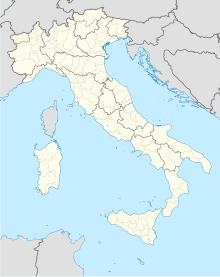The Corbeddu cave is located in the territory of Oliena, municipality of the province of Nuoro, in Sardinia. In this cave found refuge the famous Sardinian bandit Giovanni Corbeddu Salis (1844-1898), from which it took its name.
| Grotta Corbeddu Corbeddu Cave | |
|---|---|
 Inside the cave | |
| Location | Oliena (NU, Sardinia, Italy) |
The cave is about 130 meters long and consists essentially of three "rooms".[1] Inside, important archaeological finds have been made, in particular some human remains, which some authors dated to around 20,000 years ago, which if correct constitutes the oldest evidence of humans on Sardinia.[1] However, this claim has been contested, with others suggesting that there is no solid evidence for the presence of humans on Sardinia-Corsica until the early Mesolithic, around 10,000 years ago.[2]
In addition, bone and stone tools were discovered that were used by these prehistoric people in their daily lives. The cave, as evidenced by further findings, was also inhabited during the Neolithic period. In addition to the human bones in the cave there were numerous bones of extinct endemic animals such as the Sardinian dhole,[3] the deer Praemegaceros cazioti and the lagomorph Prolagus sardus.[1]
References
edit- ^ a b c "Oliena, grotta Corbeddu". Archived from the original on 2015-02-02. Retrieved 2018-03-18.
- ^ Palombo, M.R.; Antonioli, F.; Lo Presti, V.; Mannino, M.A.; Melis, R.T.; Orru, P.; Stocchi, P.; Talamo, S.; Quarta, G.; Calcagnile, L.; Deiana, G.; Altamura, S. (May 2017). "The late Pleistocene to Holocene palaeogeographic evolution of the Porto Conte area: Clues for a better understanding of human colonization of Sardinia and faunal dynamics during the last 30 ka". Quaternary International. 439: 117–140. doi:10.1016/j.quaint.2016.06.014.
- ^ V. Eisenmann & B. van der Geer. (1999). The Cynotherium from Corbeddu (Sardinia): comparative biometry with extant and fossil canids. Deinsea, 7(1), 147–168.
External links
edit- "Sardegna Cultura, Oliena, grotta Corbeddu". Archived from the original on 2015-02-02. Retrieved 2018-03-18.
